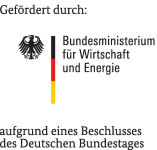The focus of the R&D project is the investigation of the influence of the deviation moments in interaction with the main moments of inertia on the movement behaviour of a ship in oblique seas. Extensive numerical investigations will be carried out for different ship forms. These results are to be verified in the laboratory. For this purpose, it is necessary to further develop and test a speed and course controller developed for smooth water navigation for sea state conditions when sailing in waves with different approach directions.
Another focus is on the development of a numerical method that makes it possible to calculate and visually display the optimal mass distribution of a laboratory model, taking into account all specified inertia parameters including the deviation moments. The aim is to significantly reduce the time needed to trim a laboratory model for sea state tests. The procedure is to be structured in such a way that, on the basis of a CAD file of the interior of a laboratory model, all the necessary devices, equipment elements and trim weights are arranged according to the optimisation algorithm developed and, after calculating the moments of inertia, the actual values are automatically compared with the target values.

| Title: | Influence of the deviation moments on the sea state behaviour |
| Term: | 10/2019 – 03/22 |
| Project Manager: | Dr. Matthias Fröhlich |
| Founding: | Federal Ministry for Economic Affairs and Energy |
| Project administration: | EuroNorm GmbH |
| Reg.-No.: | 49MF190066 |
In order to be able to give an initial assessment of the influence of the deviation moments on the motion behaviour of ships, simulations will first be carried out using a linear strip method. The main focus here will be on how the interaction of the deviation moment with the corresponding main moments of inertia takes place and in which orders of magnitude this has an effect on the movement behaviour.
The second focus is the development of a control algorithm that allows a standard model to travel on a defined course at a given speed in waves without coupling the model to the towing vehicle in front. The challenge in the further development of this control algorithm is to take into account the motions induced by the waves in all 6 degrees of freedom when driving in waves. In particular, the rolling, pitching and diving motions of the ship have a decisive influence on the flow of the rudder. Especially when sailing in oblique waves, effects such as the immersion of the propeller and additional lateral forces due to the effect of the waves on the ship’s hull and a temporary loss of stability due to fluctuating lever arms have an influence on the course keeping ability. Such effects must be analysed in detail and their impact minimised by short reaction times of the controller.
As a result of the R&D project, reliable results will be available under which conditions and in which areas the deviation moments have a decisive influence on the movement behaviour of a ship and must be taken into account in the future.